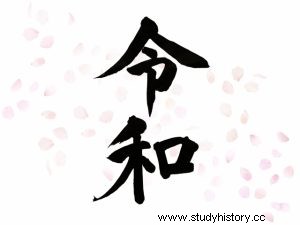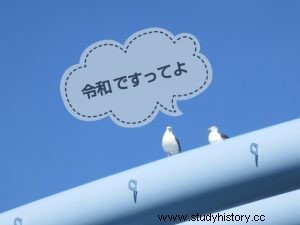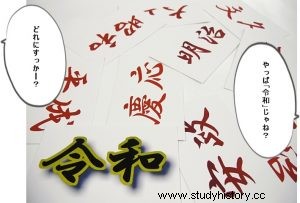
" Reiwa "-.
Isn't it a modern and fashionable era? Isn't everyone's evaluation high?
Of course, there seems to be some unpopular opinions, such as being difficult to say, "Heisei" being too good, and "decree" feeling cold.
La line is a foreign sound, and it seems that it was not in the old words. Therefore, it was not used much in past eras.
Is this the reason why it feels modern?
Anyway, new things take time and getting used to.
So, if you know the meaning and origin of the new era "Reiwa" and the other five candidates, you may be more aware of the wonderfulness of "Reiwa".
"Reiwa" is from "Manyoshu", the oldest Japanese poetry collection in Japan!

What is Manyoshu?
From the latter half of the 7th century to the 8th century, about 130 years, a collection of more than 4,500 wakashu poems written by people of various statuses, including emperors, aristocrats, junior officials, and even farmers.
Manyoshu is all written in Chinese characters, and was edited in the later Heian period. " Ancient and modern " Wakashu " Hiragana is used in.
The origin of the name of Manyoshu is "I collected the leaves of Myriad" . It's really fashionable.
What is the quotation of "Reiwa"?
Manyoshu is classified into 20 volumes, but "Volume 5 Plum Blossom Song 32 Heads" A sentence,
"At the time of the day, early spring decree, Kishu Fuwa, Umebiki Maeno powder, Ran Kaoru Gonoka."
"Sometimes, in the early spring decree, Qi Shu Ume shows ) the powder in front of the mirror. Orchids are afterwards The incense of.
"In a happy month to do anything, the outside air is pleasant and the wind softens, the plum blossoms white like a woman in front of a mirror dressed in white powder, and the orchid smells like the incense on the clothes to decorate.
In 730, the preface to the 32 heads that was written at the banquet of "Umehana no Utage" held by about 30 people.
Source from Japan's first Japanese classic. Until now, it was a source from a Chinese book, a book written in ancient Chinese texts.
However, 200 years before the Manyoshu, the Chinese poetry collection " Wen Xuan " 』 There seems to be something similar to.
"Oh, Nakaharu Reitsuki, Tokiwa Kisei"
Is it rooted in China?
In the first place, the era has its roots in China.
About the characters of "Reiwa".
This is the first time that the letters "decree" have been used in the era name, and since the letters "wa" remind us of the Showa era, old and new harmony It's a word that makes you feel.
Including "Reiwa", the number of eras used in Japan is 232 . It will be. 248 including the Northern Court of the Northern and Southern Dynasties ..
Among them, the era name starting with La line is 715 " Spirit turtle ". , 1238 " Ryakunin , 1338 " Ryakuo , And there are only four "Reiwa".
Because of this, it seems that there are many evaluations that it is very new and novel.
Five candidates besides "Reiwa"!

"Eiko" to "spread excellent things"!
Sourced from the Japanese classic "Nihon Shoki".
"Excellent and beautiful" Meaningful "English" characters and "widely spread" "Hidehiro" consists of the characters "Hiro".
There are a lot of things that have the name "Eiko", so it seemed like they would be messed up.
"Koshi" that "develops and ends up"!
Sources from the Japanese classic and the Chinese classic "The Classic of Poetry".
"Expand and develop" "Wide" which also means "wide", and "end" "To".
"Banna" to "do your best to make a peaceful world"!
Source from the Chinese poetry collection "Wen Xuan" around the 6th century.
"Do everything" "Million" and "Peace, calm, do not fight" The character "wa".
"Banpo" that "do your best to protect and help each other"!
This is also a source from the Chinese classic.
Furthermore, this is also "do everything" The character "10,000" and "Keep holding and help" The character of "ho" which means such as.
"Kyuka" who wants to change the status quo!
This, which was the last candidate, is also sourced from the Chinese classics.
"Long time" "Hisashi" and "Alternate, teach and guide" The meaning of "ka".
Summary
The new era has been decided to be "Reiwa", but unpopular opinions such as "cold" and "command" It seems that there are many.
However, I feel that it is a modern and very comfortable sounding word.
The meanings of the other five words in the list are great, but they also feel a bit lacking in newness.
The new ones are a little strange until you get used to them. Over time, everyone should be convinced.
"Reiwa"-.
It's a very fashionable era, isn't it? I love at first sight.
